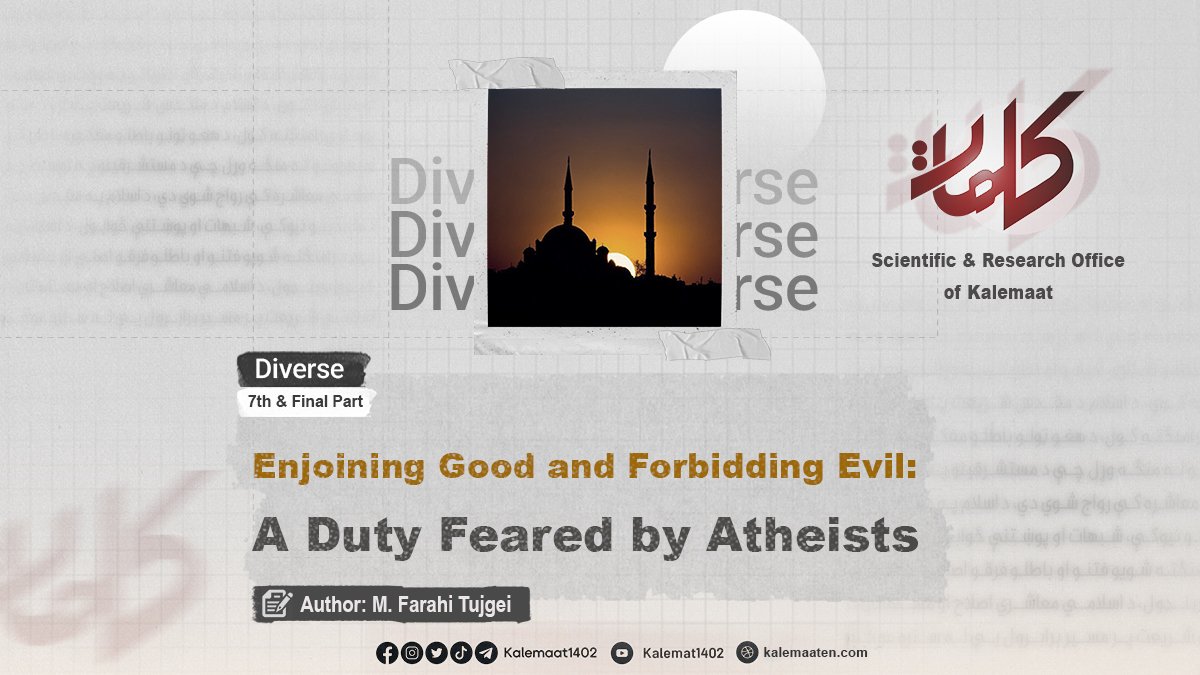Author: M. Farahi Tujegi
Enjoining Good and Forbidding Evil: A Duty Feared by Atheists (the 7th and final part)
Enjoining Evil and Forbidding Good
The Holy Quran warns the Islamic Ummah that two groups threaten the spread of good (ma’ruf) and the removal of evil (munkar) in society:
The first group is Satan and other devils who lead society towards immorality and sin, as God says: “إِنَّمَا يَأْمُرُكُم بِالسُّوءِ وَالْفَحْشَاءِ وَأَنْ تَقُولُوا عَلَى اللَّهِ مَا لَا تَعْلَمُونَ” [Al-Baqarah 2:169] Translation: Indeed, he only commands you evil and immorality and to say about Allah what you do not know. “الشَّيْطَانُ يَعِدُكُمُ الْفَقْرَ وَيَأْمُرُكُم بِالْفَحْشَاءِ وَاللَّهُ يَعِدُكُم مَّغْفِرَةً مِّنْهُ وَفَضْلًا وَاللَّهُ وَاسِعٌ عَلِيمٌ” [Al-Baqarah 2:268] Translation: Satan threatens you with poverty and commands you to immorality, while Allah promises you forgiveness from Him and bounty. And Allah is all-Encompassing and Knowing.
Believers are also warned not to follow the footsteps of Satan, for he commands immorality and evil: “يَا أَيُّهَا الَّذِينَ آمَنُوا لَا تَتَّبِعُوا خُطُوَاتِ الشَّيْطَانِ وَمَن يَتَّبِعْ خُطُوَاتِ الشَّيْطَانِ فَإِنَّهُ يَأْمُرُ بِالْفَحْشَاءِ وَالْمُنكَرِ” [An-Nur 24:21] Translation: O you who have believed, do not follow the footsteps of Satan. And whoever follows the footsteps of Satan – indeed, he enjoins immorality and wrongdoing.
The second group is the hypocrites who live in the Islamic society and pretend to have faith, while the Muslim Ummah regards them as believers committed to values, yet inwardly they are disbelievers: “الْمُنَافِقُونَ وَالْمُنَافِقَاتُ بَعْضُهُم مِّن بَعْضٍ يَأْمُرُونَ بِالْمُنكَرِ وَيَنْهَوْنَ عَنِ الْمَعْرُوفِ” [At-Tawbah 9:67] Translation: The hypocrites, men and women, are of one another. They enjoin what is wrong and forbid what is right.
It is clear that the verse does not mean the hypocrites explicitly tell people: “Do bad deeds and avoid good deeds,” for such an order would have no effect. Rather, it means they command acts that are in reality evil, yet present them as good and virtuous—just as Satan beautifies people’s bad deeds: “وَإِذْ زَيَّنَ لَهُمُ الشَّيْطَانُ أَعْمَالَهُمْ” [Al-Anfal 8:48] Translation: And when Satan made their deeds pleasing to them… “أَفَمَن زُيِّنَ لَهُ سُوءُ عَمَلِهِ فَرَآهُ حَسَنًا” [Fatir 35:8] Translation: So is he whose evil deed is made to look good to him…?
Conclusion
From the above and through examining Quranic verses and traditions, we understand the necessity and importance of enjoining good and forbidding evil. Societies are composed of diverse individuals, each with different dispositions and natures. If these groups are left without the process of enjoining good and forbidding evil—which is a social obligation that ensures the spiritual and moral vitality of the community and its health—moral and social decline will inevitably occur, and society will differ little from the savagery of animals in the jungle.
What is more important, however, is the manner of carrying out this important duty. It must be based on knowledge, patience, tolerance, and goodwill, so that the person addressed does not feel humiliated or belittled before the one enjoining or forbidding, but instead feels the utmost care and sincerity towards themselves and willingly complies.
Furthermore, enjoining good and forbidding evil is not contrary to human freedom and choice; rather, it is guidance and direction towards a better and more virtuous path. Just as a person appreciates help in material matters—so they can earn better and avoid business difficulties—they should be even more pleased with the goodwill of those who invite them to improve their moral and spiritual life. By following such advice, they gain the respect of others, safeguard themselves from moral vices, and beautify their character.
Previous Part
Sources and References:
- Abdullah. Al-Baydawi: Anwar al-Tanzil wa Asrar al-Ta’wil, known as Tafsir al-Baydawi. Dar Ihya al-Turath al-Arabi, Beirut – Lebanon, 1418 AH / 1998 CE.
- Abu Abdullah Muhammad ibn Ahmad ibn Abi Bakr ibn Farah al-Ansari al-Khazraji Shams al-Din al-Qurtubi (d. 671 AH). Al-Jami’ li Ahkam al-Qur’an wa al-Mubayyin lima Tadammanahu min al-Sunnah wa Ay al-Furqan. Publisher: Dar al-Kutub al-Misriyyah – Cairo. 2nd edition, 1384 AH / 1964 CE.
- Abd al-Rahman Hasan Hubnakah al-Maydani. Fiqh al-Da‘wah ila Allah wa Fiqh al-Nasihah wa al-Irshad wa al-Amr bil-Ma‘ruf wa al-Nahy ‘an al-Munkar. Publisher: Dar al-Qalam – Damascus.
- Abdul Karim Zaidan. Usul al-Da‘wah. 5th edition. Lebanon: Al-Risalah Foundation, 1417 AH / 1996 CE.
- Sahih al-Bukhari. Muhammad ibn Isma‘il. Al-Jami‘ al-Sahih. Edited by Muhammad Zuhair ibn Nasir al-Nasir. Beirut: Dar Tawaq al-Najat, 1422 AH / 2001 CE.
- Al-Ghazali, Abu Hamid. Ihya’ ‘Ulum al-Din. Edited by Badi‘ al-Sayyid al-Lahham. Beirut: Dar Ibn Kathir, 1413 AH / 1993 CE.
-
Muslim ibn al-Hajjaj. Sahih Muslim. Edited by Muhammad Fu’ad Abd al-Baqi. Beirut: Dar Ihya al-Turath al-Arabi, n.d.



